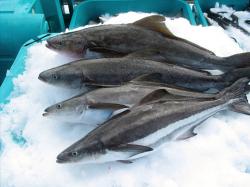S.C. DHEC Updates 'Fish Smart, Eat Smart' Campaign, Adds Cobia Advisory
May 13, 2011 | 2 min to read

COLUMBIA, S.C. – South Carolinians who like to fish can go online for updated information to find out if the fish on their line is safe to eat or if it should be released because of possible contamination, the state Department of Health and Environmental Control reported today.
"Our website at www.scdhec.gov/fish has a state map with the latest advisories, information, a booklet and other materials that can be downloaded," said David Wilson, chief of DHEC's Bureau of Water. "This information will help our citizens determine whether to keep and eat the fish they catch in South Carolina waters or release them back into the water."
According to Wilson, certain species and waterbodies in the Catawba River Basin have been added to this year's advisories due to polychlorinated biphenyls (PCB) levels in the fish tissue. The consumption recommendations for largemouth bass from Lake Wylie and the Catawba River are for no more than one meal per week. Largemouth bass from Fishing Creek and Cedar Creek should be eaten no more than once per month. Advisory signs have been posted at public boat landings around the Catawba River, Lake Wylie, Fishing Creek and Cedar Creek. Additionally, cobia has been added to the advisories in the Atlantic Ocean due to mercury levels. Consumption recommendations for this species are for no more than one meal per month.
"People can still safely eat fish taken from the state's waters if they follow the fish consumption advisory guidelines," Wilson said. "These guidelines tell you the types and amounts of fish that are safe to eat from waters in South Carolina."
Each advisory is based on one meal (or 8 ounces) of uncooked fish, which is about the size of two decks of cards. Consumption advice is given for a specific species of fish within a water body. The contamination is in the fish and does not make the water unsafe for recreational or drinking uses.
Fish are an important part of a healthy diet for everyone, including women and children. Fish contain protein and nutrients, are low in saturated fat, and contain omega-3 fatty acids.
Wilson said, however, that pregnant women, women who might become pregnant, infants, and children should not eat any fish with an advisory. These high-risk groups are also advised to not eat any king mackerel, shark, swordfish, tilefish, or cobia.
Copies of the 2011 Fish Consumption Advisory booklets will be available from DHEC county public health departments, DHEC regional offices, the S.C. Department of Natural Resources district offices, Sportsman's Warehouse in Columbia, Bass Pro Shop in Myrtle Beach, OB/GYN offices, health clinics and many state parks or on DHEC's website at: http://www.scdhec.gov/fish.
For additional questions or concerns about fish consumption advisories, call DHEC's Fish Advisory Hotline toll-free at 1-888-849-7241.
Source: South Carolina Department of Health and Environmental Control
